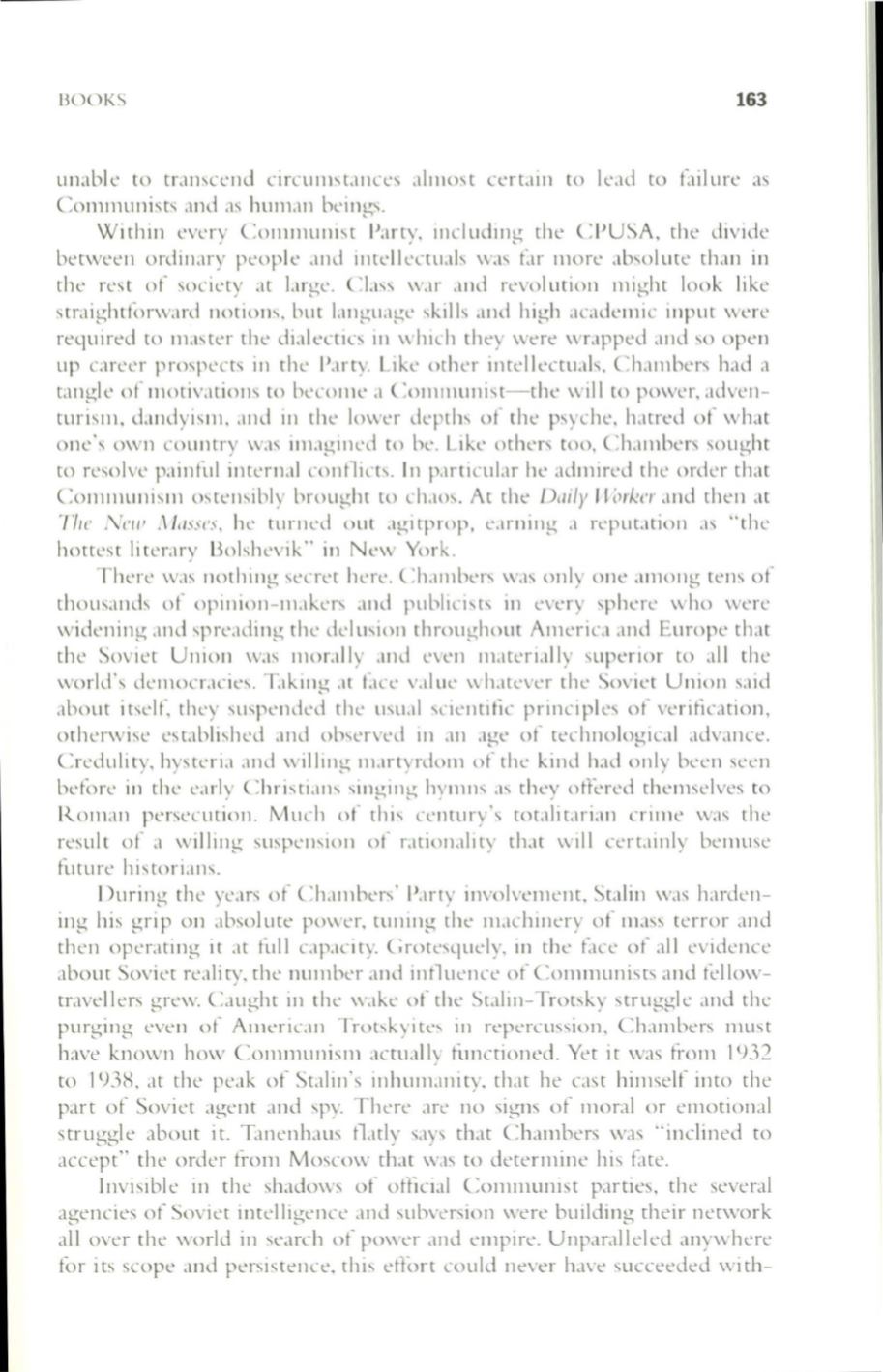
l300KS
163
unable to trallScend circuIllstances alnlOst certain to lead to failure as
COIllIl1unists and as hUIllan beings.
Within every COIl1J1lunist Party, including the C]>USA, the divide
between ordinary people and illtdlectuals was far J1lore absolute than in
the rest of society at large. Class W;lr amI revolution might look like
straightf(.)rward notiollS, but Ll11guagl' skills and high academic input were
required to master the dialectics in which they were wrapped and so open
up career prospects in the Party. Like other intellectuals, Chambers had a
tangle of Il1otivatioIlS to bl'coIlle a COIl1Illunist-the will to power, adven–
turisJ1l, dandyism, and in the lower depths of the psyche, hatred of what
one's own coulltry was iIl1aginl'd to be. Like others too, ChaJ1lbers sought
to resolve painful illtemal conflicts. In p,lrticular he admired the order that
Con1JllunisIl1 ostellSibly brought
to
Ch,10S. At the
Daily
II
()rker
and then at
The Nelli
1\/<lSSCS,
he tuml'd out agitprop, eaming a reputation as "the
hottest literary 13olshevik" in New York.
There was nothing secret here. Chambers was only one ,1Jllong tens of
thousands of opinion-Il1akers and publicists in every sphere who were
widening ,l11d spreading the delusion throughout America and Europe that
the Soviet Union was J1lorally ,md ewn Illaterially superior to all the
world's deJ1locr,lCies. Taking at t:1Ce value whatever the Soviet Union said
about itself, they suspended the usual scientific principles of verification,
otherwise established and observed in an age of technological advance.
Credulity, hysteria and willing nl.1rtyrdom of the kind had only been seen
before in the early ChristiallS singing hynllls
;IS
they offered themselves to
lZ.oman persecution. Much of this century's totalitarian criIlle was the
resul t of a willing suspension of r;nionali ty that will cert.1inly bemuse
future historians.
During the years of Chambers' Party involveIllellt, Stalin was harden–
ing his grip on absolute power, tuning the J1l.1Chinery of nlass terror and
then operating it at full clp.1city. Crott'squdy, in the
t~lce
of all evidence
about Soviet reality, the nUIl1ber and intluence of COIllmunists and tellow–
travellers grew. Caught in the wake of the Stalin-Trotsky struggle and the
purging even of Americ.1n
Trotskyitl'~
in repLTcussion, Chambers Illust
have known how Con1Jllunism actu;ll1y functioned. Yet it was fi'oJ1l
1<)32
to
1
<)3~,
at the peak of Stalin's inhum,lIlity, that he cast himself into the
part of Soviet agent and spy. ThLTl' are no signs of moral or emotional
struggle about it. Tanenhaus fl.1tly says that Ch,lI11bers was "inclined to
accept" the order ti'oJ1l Moscow that was
to
determine his fate.
Invisible in the shadows of ottici,d Communist parties, the sewral
agencies of Soviet intelligencc ,md subversion were building thcir nctwork
all over the world in search of powcr and empire. Unparalleled anywhere
for its scope and pLTsistence, this dli:)rt could newr ha\'e succeeded with-


